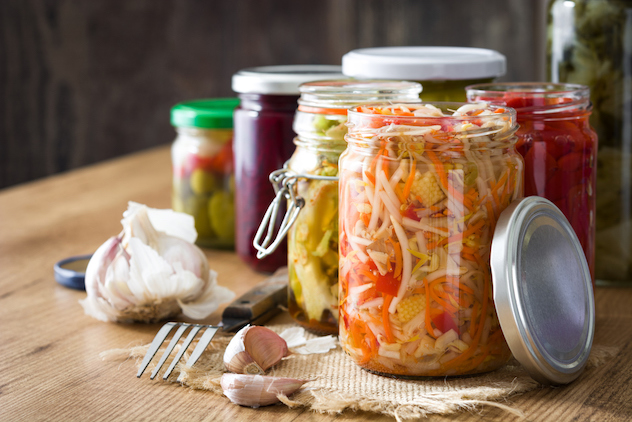Kimchi
A traditional spicy Korean dish, kimchi is made by fermenting vegetables such as cabbage and radish, resulting in a healthy dose of lactobacilli.
Serve it with rice or try it as a baked potato topping or with scrambled eggs.
Olive oil
It may seem like a bog-standard staple that sits by your stove but a healthy dose of olive oil can do wonders for your tummy.
It’s full of fatty acids and polyphenols, which your gut bacteria and microbes use to reduce gut inflammation.
As well as cooking with it, drizzle olive oil over salads and veges, or use it to make a dressing.
Fermented goodies
No, we’re not talking about alcohol, but fermented foodstuffs offer a bounty of probiotics, fibre and vitamins that your gut will thank you four.
Sauerkraut is a classic example but the recipes for tasty, fermentable side dishes or accompaniments are endless.

Check out the MiNDFOOD guide to fermentation, which breaks down the many health benefits and will give you some inspiration to try it for yourself at home.
Miso/tempeh
Soy beans are the basis for both miso and tempeh, which are made using traditional fermentation processes and are considered to be probiotics.
To ensure your miso has live microorganisms, choose an unpasteurised product that will need to be stored in the fridge.
Tempeh can be used just as you would tofu, stir-fried with vegies or added to curries and soups.
Apples
The pectin in apples is a form of soluble fibre, which draws water from your digestive tract and forms a gel, helping to slow digestion.
The bacteria in the intestines also like to feed on pectin, making apples another prebiotic to add to the list.
Garlic, onions & leeks
These pungent-tasting prebiotics all contain inulin, a starchy carbohydrate that feeds good bacteria.
Favourites when it comes to flavouring foods, they are easy to add to any menu.
Other prebiotics include asparagus, fennel and beetroot.
Turmeric
The curcumin in turmeric is said to be a powerful antioxidant that helps with indigestion and reduces inflammation.
Turmeric has been used for centuries in both Ayurvedic and Chinese medicine as an anti-inflammatory.
Commercial turmeric teas are now available or you can try making a fresh turmeric paste that you can add to boiling water for a soothing hot drink, adding honey or lemon to taste.
Legumes
These include beans, peas and lentils, and are one of the best sources of resistant starch.
Monash University experts advise introducing them gradually to give both your gut and bacteria time to adapt to the increased fibre.




